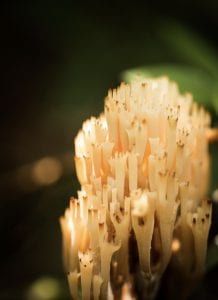Healthy Living: Boost Your Brain with Lion’s Mane
 Brain fog: it’s a thing. Especially during a busy workweek, where too many to-do items have a tendency to sneak up on you. Maybe you’ve been staring at the computer screen for far too long and are starting to get that glazed-over feeling of your mind going numb.
Brain fog: it’s a thing. Especially during a busy workweek, where too many to-do items have a tendency to sneak up on you. Maybe you’ve been staring at the computer screen for far too long and are starting to get that glazed-over feeling of your mind going numb.
We all go through it, especially me, and during the times when my morning cup of coffee simply isn’t cutting it, more often than not I rely on something else. Something much stronger in potency, yet healthier, to dust out the mental clutter and enhance my concentration on tasks ahead.
That something is lion’s mane mushroom.
It wouldn’t seem like the obvious answer to the solution, yet this inconspicuous little fungi goes beyond being a culinary chef’s delight.
Lion’s mane—Hericium erinaceus—is revered for its medicinal properties. Yes, it’s edible. For those of us that live in Boulder, Colorado, it can be found at most natural grocery stores in town. Or, if you’re really lucky, maybe you can scope it out, freshly picked, at the ever-so-popular Saturday farmer’s market down on 13th and Arapahoe. We Boulderites tend to pride ourselves on healthy food, nature, and plant medicine; lion’s mane just so happens to be all three.
Why do I hold such high regard for a fungi? Well, if I’ve successfully piqued your curiosity, read on to discover how lion’s mane can positively impact the human brain at cognitive, physiological, and emotional levels. Knowledge is by experiment–I speak from personal experience. I take this mushroom in capsule form on a daily basis, and either I trick myself into a placebo and mental patterns seem to feel more organized, or it really does help to curb that pesky writer’s block.
- IT MAY PROTECT AGAINST COGNITIVE DECLINE

With a white, shaggy fruiting body, these mushrooms definitely live up to their name. Even more so, the long, clustered tubes take on the appearance of nerves themselves. Used for centuries as both food and medicine across multiple Asian countries, lion’s mane contains two compounds that can stimulate brain cell growth: hericenones and erinacines.
As we age, the brain becomes less plastic in its ability to form new neural connections, which could explain why older adults become prone to cognitive dysfunction. This is where lion’s mane can help. Incorporating this mushroom into one’s diet and lifestyle could potentially reduce or even prevent age-related neurodegenerative diseases—Alzheimer’s being one of the most severe1. Some scientific studies suggest that lion’s mane is not only effective in improving mild cognitive impairment in older adults, but also appears to reduce symptoms of memory loss, boosts mental function, and increases overall alertness.
In a society of work-driven individuals, I’d say this is the perfect cognitive compliment for staying on top of your game. For me personally, I take two capsules per day, thirty minutes before my fingers hit the keyboard. Having done this for nearly a year, I find that not only am I able to concentrate for longer periods of time with minimal distraction, but my mental thought processes become much less muddled.
Although encouraging, it’s important to keep in mind that research in this area is still being developed. Most clinical trials have been largely animal-based. Nothing is fully guaranteed. In order to truly put lion’s mane to the test, more human studies are needed.
The good news is that, as a readily available supplement, we can always start the experimentation process by trying it for ourselves.
- CAN POSSIBLY REDUCE ANXIETY AND DEPRESSION

Mental health is just as important as physiological health. Both mind and body are interconnected systems. There are several reasons for why symptoms of anxiety and depression surface. Being multifaceted mental illnesses, there isn’t simply one solution at hand, yet lion’s mane may have its own important role to play in the relief process.
One small, yet hopeful 2010 study published in Biomedical Research tested lion’s mane on a group of women with varying menopausal symptoms. For a period of four weeks, these women (thirty total) consumed cookies each day containing either lion’s mane extract or a placebo. Post-trial period, researchers observed that members of the lion’s mane group not only reported lower levels of anxiety and irritation than the women in the placebo, but also diminished depressive symptoms.
Other animal studies suggest that anti-inflammatory properties found in lion’s mane not only help reduce symptoms of anxiety and depression, but may also aid in speeding up the recovery processes for nervous system-related injuries by stimulating nerve growth.
Specifically, chronic inflammation can be a huge contributing factor when it comes to anxiety. From my own personal experience, I began taking lion’s mane in the hopes of supporting, not curing, my own recovery process from sporadic nerve pain due to an impact-related injury to my lower back. Over time, the pain did subside, and I believe the mushroom supplement played its part, but not all on its own. Like I said, studies in this realm, overall, are limited. More research needs to be conducted…yet hope still remains.
GIVE IT A SHOT!

In the meantime, I’ve given enough reason for why you should indulge in this mushroom. Lion’s mane is incredibly versatile. Apart from the potential medicinal value, it’s delicious when added to a main course dish (just look up a recipe for a lion’s mane mushroom sandwich, and you’ll forever be in heaven). And if that’s not enough to convince you, try it in coffee or tea form—you’ll be pleasantly surprised.
Not saying this is a guarantee, but with long-term use, it’s possible that you’ll begin to notice improvements in your own cognitive and neurological functions. Overall, these mushrooms are a healthy addition to your lifestyle no matter what. It’s a win-win situation. Enjoy!








